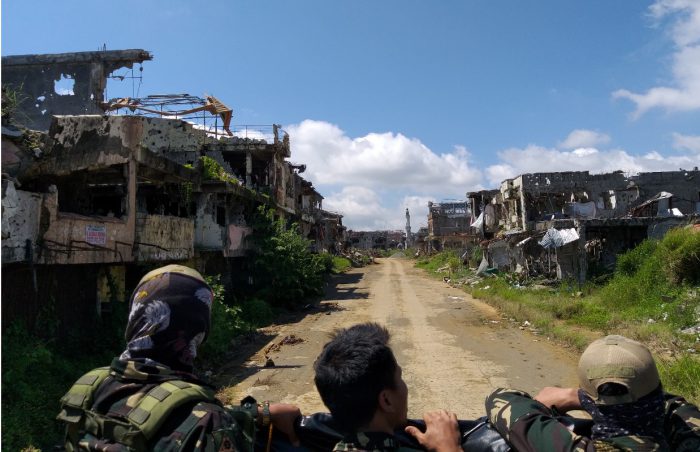
There is a growing debate, domestically and internationally, about the nature of future conflict. Recently Australian Defence Force chief Angus Campbell drew attention to political warfare as a key element of a changing threat paradigm.
The Australian Army’s futures statement, titled ‘Accelerated warfare’, warns that ‘the advent of rapidly evolving, easily accessed technology increasingly offers asymmetric capabilities to both established powers as well as non-state actors and even individuals’. It notes that the intersection of such technology with geostrategic and socio-political change, including urbanisation, increases the scope for adversaries to coerce, control and influence. This demands a response that integrates kinetic elements and information operations.
The Marawi crisis—the seizure of the Southern Philippine city by militants linked to Islamic State and the response by Philippine authorities from May to October 2017—illustrates such a strategic play by asymmetric actors within an evolving threat landscape. Adopting a ‘seize–defy–discredit’ approach, and replicating IS tactics employed in Mosul and Raqqa, insurgents tapped into an existing militant clan culture to raise a thousand-man force with stockpiled weapons and explosives.
The insurgency’s key objectives were to seize dense urban terrain and hold the population hostage; defy the government by exploiting the acute difficulties it had regaining control; and discredit the government by forcing either capitulation or the destruction of the city. As it turned out, the Armed Forces of the Philippines took five months to regain control and destroyed much of Marawi in the process.
Our latest report for ASPI, The Marawi crisis—urban conflict and information operations, examines both the capability aspects of kinetic hard power and the lessons from soft-power information operations, and how they intersect in the urban environment. It draws on interviews with academics, members of the Philippine military in Manila and Marawi, local government stakeholders and displaced residents in Mindanao during a research trip in October 2018.
The report highlights the need for states to be better prepared to engage in kinetic urban operations, or to support allies in such operations, with a clear focus on reducing military and civilian casualties. Equally important, it demonstrates the relevance of widening the concept of ‘the battlefield’ to include the narrative space.
The insurgents’ seizure of Marawi was accompanied by a systematic IS propaganda campaign aimed at projecting an image of triumph and strength. The Philippine forces engaged in active counter-messaging to undermine rebel narratives, both online and through traditional methods such as leaflet drops, banners, and radio or loudspeaker broadcasts. Tactically, the objectives were to avoid civilian casualties and to stem further recruitment and popular support for the insurgents. Strategically, the messaging was intended to morally denounce the militants and undercut their support bases.
Our report provides the following insights and recommendations.
Hard power
It can be tempting to attribute the five-month-long fight for Marawi to unpreparedness of the Philippine military. Similarly, a seize–defy–discredit strategy may appear to be relevant only when there’s both a substantial jihadi force and a compliant or coerced population. Such deductions overlook the acute challenges urban terrain presents to any military, no matter how well trained.
Eliminating the last 50 militants from an area less than a kilometre square still took a month—despite hard-won operational experience, new weapons and equipment and the support of allies. Critics of the Philippine response ignore the similar experiences of our allies in recent battles such as Mosul. Without specialist capabilities, a force clearing a determined enemy from urban terrain suffers heavy losses unless it applies overwhelming firepower—inevitably causing casualties among civilians.
After decades of low-cost ‘precision war’, the Australian public don’t expect to pay such a price. That dissonance represents a reputational risk for the ADF that adversaries can exploit. There’s a requirement for:
- a whole-of-government capacity to enable and encourage populations to leave cities during armed conflict
- capabilities that reduce risks to soldiers and civilians during urban combat operations, including unmanned robots, smoke systems and special weapons that breach walls or attack targets inside buildings with reduced collateral damage
- an Australian army combat engineering entity that’s able to conduct unmanned combat search and clear operations in an urban environment in support of our own or friendly nations’ operations.
The destruction of Marawi has given rise to accusations of the use of excessive, indiscriminate force by the Philippine armed forces—a source for further extremist recruitment. This highlights the need for clear, open communication on the dilemmas of urban warfare in order to avoid a loss of legitimacy. The Philippines’ political and media environment—exemplified by tight government control of media narratives during the battle—is distinctly different from that of Australia.
The Marawi information operations nevertheless provide a useful case study that highlights some key principles of building legitimacy. They can be applied beyond military operations to the ensuing political process and the wider practice of preventing and countering violent extremism.
The narratives surrounding the conduct of operations aren’t merely a supporting element but are just as crucial as the military objective. Effective use of soft power plays an important role in achieving a favourable political outcome.
Ultimately, Marawi demonstrates that the most essential elements in a soft-power campaign are credibility and legitimacy beyond mere persuasion—especially considering whole-of-government responses shaped by political imperatives and long-term security and stability concerns. This means going beyond reputational concerns.
Key lessons include the following:
- Responding to the socio-political and emotional realities of the target audiences in an empathetic way is crucial in proactively avoiding the ethical traps jihadis (or other asymmetrical actors) seek to lay.
- Political victory can be brought about only by avoiding dissonance between military/government effects and narratives. Legitimacy requires a close match between words and deeds.
- Information operations shouldn’t be regarded as a technical exercise but a human one, premised on a thorough understanding of the causes and drivers of political violence. This includes a focus on values and ethical stances, and how they’re constructed on the ground.

No comments:
Post a Comment
Note: Only a member of this blog may post a comment.